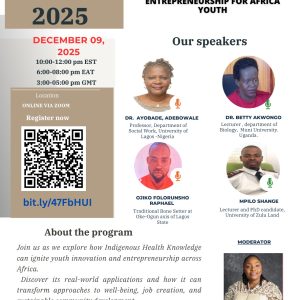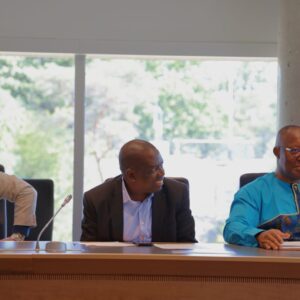
Akwete: Weaving Heritage, Empowering Generations
Indigenous Health and Well being: Opportunities for Jobs and Entrepreneurship for African Youth The Africa Indigenous Knowledge Research Network (AIKRN)
The Batwa, an indigenous people of Uganda, are among the most marginalized communities not just in the country, but in the whole world. Nestled in the impenetrable forests of Bwindi and Mgahinga in southwestern Uganda, the Batwa have historically lived as hunter-gatherers, often relying on the rich natural resources of their ancestral lands. However, their displacement from these lands in the 1990s, when the Ugandan government gazette their traditional forests as national park, marked the beginning of a long struggle for survival, identity and empowerment.
Today, the Batwa community grapples with severe socio-economic challenges, ranging from limited access to education and healthcare to extreme poverty and social exclusion. Despite these hardships, Batwa women, in particular, exhibit remarkable resilience and possess an entrepreneurial spirit that, if properly harnessed, could transform their lives and uplift their communities.
Following a study we have conducted titled: “Women’s Agency and entrepreneurial skill empowerment among the Batwa Indigenous community of Uganda,” this blog post explores the significance of women’s agency and entrepreneurial skill empowerment among the Batwa, highlighting the challenges the face and the opportunities that lie ahead. We are convinced that our findings can help augment and support Batwa women in improving their entrepreneurial skill sets.
In the Batwa culture, women are the custodians of wealth of traditional/indigenous knowledge and skills. These have been passed down through generations. From crafting intricate beadwork and pottery to harvesting and utilizing medicinal plants, our study finds that these women have a deep connection to their environment and a unique understanding of local resources. This knowledge, coupled with their resilience and adaptability, forms the foundation of their entrepreneurial potential. However, the transition from a forest-dwelling lifestyle to a one that requires integration into a modern economy has not been easy for the Batwa. Over the years, they have been displaced from their ancestral lands. And this means they have struggled to find alternative livelihoods in an unfamiliar socio-economic landscape. Despite these challenges, Batwa women continue to innovate and create, drawing on their cultural heritage to produce goods that are not only unique, but also culturally significant.
The entrepreneurial journey of Batwa women is fraught with numerous obstacles. Key among these is the lack of access to financial resources. Traditional financial institutions often view the Batwa as high-risk clients due to their marginalized status and lack of collateral. As a result, Batwa women have limited opportunities to access credit, making it difficult to start or expand their businesses.
Gender-based discrimination and inequality further exacerbate the challenges faced by Batwa women. In many indigenous communities, including the Batwa, patriarchal norms often restrict women’s participation in economic activities and decision- making processes.This marginalization is compounded by low levels of formal education and training, which limit their ability to engage in more lucrative entrepreneurial ventures. Additionally, our study has found out that Batwa women face significant barriers in accessing markets and networks. The remote locations of their communities and the lack of infrastructure, such as roads and communication systems, make it difficult for them to reach potential buyers or suppliers. This isolation limited their market reach and reduces their opportunities for growth. Balancing entrepreneurial activities with household responsibilities is another major challenge we found out from our study. Batwa women are often the primary caregivers in their families, responsible for tasks such as child-bearing, cooking, and fetching water. These duties leave them with time and energy to dedicate to their businesses, hindering their ability to scale up and succeed.
Women’s agency, or the capacity to make decisions and act upon them, is a crucial factor in their empowerment. For Batwa women, strengthening their agency involves increasing their control over resources, enhancing their decision-making power, and improving their ability to negotiate better outcomes for themselves and their families. For instance, community-based organizations and NGOs working with the Batwa have recognized the importance of women’s agency in driving entrepreneurial success. These organisations have implemented various initiatives aimed at empowering Batwa women, including literacy and vocational training programmes, microfinance schemes, and leadership development workshops. One notable example is the Support for Women in Agriculture and Environment (SWAGEN), which has launched initiatives to support Batwa women in producing and marketing clay cooking stoves. These stoves are not only environmentally sustainable but also commercially viable, providing women with a source of income while promoting the conservation of local resources. Another organization, the United Organization of Batwa Development in Uganda (UOBDU), has focused on enhancing the advocacy skills of Batwa women through paralegal training. This training equips them with the knowledge and tools to navigate legal systems, secure land rights, and advocate for their community’s needs. By empowering women to stand up for their rights, UOBDU is helping to strengthen their agency and improve their socio-economic status.
Despite the challenges, there are significant opportunities for Batwa women to grow their entrepreneurial ventures. The increasing global demand for sustainable and ethically sources products present a promising market for the unique goods created by Batwa women. Their products, which are deeply rooted in their cultural heritage, resonate with consumers who value authenticity and sustainability. Digital platforms and e-commerce also offer new avenues for Batwa women to reach a wider audience. By leveraging technology, they can overcome the geographical limitations that have traditionally restricted their market access. Training in digital literacy and e-commerce can enable them to sell their products online, connect with global buyers, and expand their businesses beyond their local communities.
Moreover, the growing recognition of the value of traditional knowledge and products provides Batwa women with an opportunity to capitalize on their cultural assets. Collaborations with cultural institutions, museums, and tourism organizations can help promote their crafts and attract customers interested in indigenous art and culture.
To fully realize the entrepreneurial potentials of Batwa women, it is essential to adopt a gender-responsive approach that addresses the specific challenges they face. From our findings, we observe that this would involve creating policies and programmes that are sensitive to the unique needs of indigenous women and that prioritize their empowerment. For example, providing access to financial resources is a crucial first step. Microfinance institutions and community savings groups can offer tailored financial products that cater to the needs of Batwa women, enabling them to start or expand their businesses. Additionally, investment in education and training is vital. By equipping Batwa women with the skills and knowledge needed to succeed in the modern economy, we can help them break free from the cycle of poverty and marginalization. Empowering Batwa women, therefore, requires a cultural shift that recognizes their contributions and promotes gender equity within their communities.
In conclusion, our study’s focus on the potential of women’s agency and entrepreneurial skillset in liberating Batwa women from economic hardships cannot be overemphasized. The entrepreneurial skill empowerment of Batwa women is not just about improving their economic status; it is about enhancing their agency, preserving their cultural heritage, and ensuring their voices are heard in decision-making processes that affect their lives. Our call to action is premised on supporting the entrepreneurial endeavors of Batwa women, through which we all can contribute to their empowerment and the overall development of their communities. As Uganda moves towards achieving its Vision 2040 and the UN’s Sustainable Development Goals, the empowerment of Indigenous women like the Batwa must be at the forefront of these efforts. Through targeted interventions that address the unique challenges faced by Batwa women, we can contribute to unlocking their potentials, foster sustainable development, and create a more inclusive and equitable society.

Indigenous Health and Well being: Opportunities for Jobs and Entrepreneurship for African Youth The Africa Indigenous Knowledge Research Network (AIKRN)

Indigenous Health and Well being: Opportunities for Jobs and Entrepreneurship for African Youth The Africa Indigenous Knowledge Research Network (AIKRN)

Highlighting the Transformative Power of African Indigenous Knowledge Highlighting the Transformative Power of African Indigenous KnowledgeAt a time when many
The Africa Indigenous Knowledge Research Network was created to undertake research geared towards identifying, re-centering and harnessing Indigenous knowledge in Africa.
©2026 copyright africaindigenousresearch.com